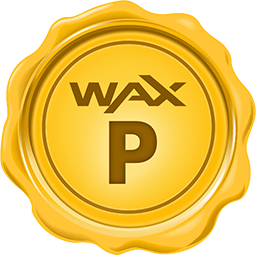-
 Bitcoin
Bitcoin $85,236.8618
0.90% -
 Ethereum
Ethereum $1,615.9773
1.41% -
 Tether USDt
Tether USDt $0.9996
-0.02% -
 XRP
XRP $2.0883
0.66% -
 BNB
BNB $591.2394
-0.31% -
 Solana
Solana $138.7789
3.57% -
 USDC
USDC $0.9997
-0.02% -
 Dogecoin
Dogecoin $0.1571
-0.57% -
 TRON
TRON $0.2426
0.82% -
 Cardano
Cardano $0.6304
0.44% -
 UNUS SED LEO
UNUS SED LEO $9.3083
0.85% -
 Chainlink
Chainlink $12.9679
2.88% -
 Avalanche
Avalanche $20.2445
5.87% -
 Stellar
Stellar $0.2481
3.09% -
 Toncoin
Toncoin $2.9678
-0.99% -
 Shiba Inu
Shiba Inu $0.0...01230
0.25% -
 Hedera
Hedera $0.1667
0.48% -
 Sui
Sui $2.1626
1.33% -
 Bitcoin Cash
Bitcoin Cash $334.6897
-2.24% -
 Hyperliquid
Hyperliquid $18.0279
6.84% -
 Polkadot
Polkadot $3.8084
3.15% -
 Litecoin
Litecoin $76.0021
-0.32% -
 Bitget Token
Bitget Token $4.5255
2.93% -
 Dai
Dai $0.9999
-0.01% -
 Ethena USDe
Ethena USDe $0.9992
-0.02% -
 Pi
Pi $0.6488
4.29% -
 Monero
Monero $211.1432
-2.44% -
 Uniswap
Uniswap $5.3268
2.64% -
 Pepe
Pepe $0.0...07424
2.66% -
 OKB
OKB $50.9311
0.82%
what is the relationship between blockchain and distributed lecdger technology
Blockchain is a specific type of distributed ledger technology (DLT), utilizing cryptographic hashing and chained blocks for data integrity, unlike some other DLTs with varying decentralization and consensus mechanisms.
Mar 21, 2025 at 05:28 am
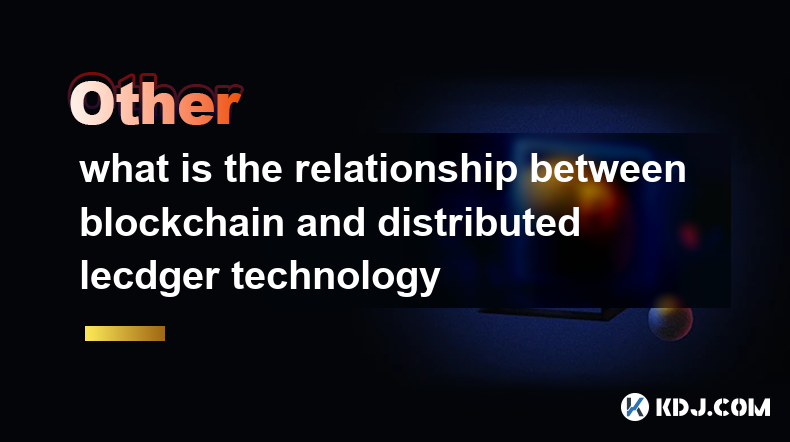
Key Points:
- Blockchain is a specific type of distributed ledger technology (DLT).
- DLT is a broader concept encompassing various ways to record and share data across multiple participants.
- Blockchain uses cryptographic hashing and a chain of blocks to ensure data integrity and security, features not necessarily present in all DLT systems.
- Different DLTs offer varying levels of decentralization, permissioning, and consensus mechanisms.
- Understanding the distinctions clarifies the unique capabilities and limitations of each technology.
What is the Relationship Between Blockchain and Distributed Ledger Technology?
The relationship between blockchain and distributed ledger technology (DLT) is best understood as a subset relationship. Blockchain is a type of distributed ledger technology, but not all DLTs are blockchains. Think of DLT as the overarching category, encompassing various methods for recording and sharing data across multiple parties without a central authority. Blockchain, then, represents a specific implementation of this broader concept.
Distributed Ledger Technology (DLT): A General Overview
DLT, at its core, aims to create a shared, replicated database that is accessible to multiple participants. This shared record eliminates the need for a single, trusted intermediary, fostering transparency and potentially reducing costs and improving efficiency. Various DLT systems employ different methods to achieve consensus on the state of the ledger, which we'll explore further. The key is the distributed nature; the data isn't held in one place, making it resistant to single points of failure.
Blockchain: A Specific Type of DLT
Blockchain distinguishes itself through several key characteristics. Firstly, it employs a chain of "blocks," each containing a batch of transactions. These blocks are linked cryptographically, meaning that altering any single block would instantly invalidate the entire chain, ensuring data integrity. This cryptographic linking is achieved through hashing algorithms, creating a tamper-evident record.
Secondly, many blockchains operate on a decentralized basis, meaning no single entity controls the network. Consensus mechanisms, like Proof-of-Work or Proof-of-Stake, are employed to validate transactions and add new blocks to the chain. This decentralization enhances security and resilience. However, it's important to note that not all blockchains are fully decentralized; some are permissioned, allowing only authorized participants to access and modify the ledger.
Beyond Blockchain: Other DLT Implementations
While blockchain has gained significant attention, other DLT implementations exist, each with its strengths and weaknesses. These alternatives may use different consensus mechanisms, data structures, and permissioning models. For instance, some DLTs might utilize a directed acyclic graph (DAG) structure instead of a linear chain, offering potentially higher transaction throughput. Others might employ different consensus algorithms optimized for specific use cases.
Permissioned vs. Permissionless DLTs
A crucial distinction within the DLT landscape is the concept of permissioning. Permissionless DLTs, like many public blockchains, allow anyone to participate in the network. This open nature promotes decentralization and transparency. In contrast, permissioned DLTs restrict access and participation to a pre-defined set of participants. This approach offers greater control and potentially higher security but sacrifices some of the decentralization benefits.
Consensus Mechanisms: The Heart of DLT
Various consensus mechanisms are employed in both blockchain and other DLTs to ensure agreement on the state of the ledger. Proof-of-Work (PoW), commonly used in Bitcoin, relies on computational power to validate transactions. Proof-of-Stake (PoS), used in Ethereum 2.0 and other networks, involves validators staking their cryptocurrency to participate in consensus. Other mechanisms, such as Practical Byzantine Fault Tolerance (PBFT) and Raft, are tailored to different network characteristics and performance requirements.
The Advantages of DLT over Traditional Systems
Compared to traditional centralized databases, DLT offers several advantages. The distributed nature enhances security and resilience, making it less vulnerable to single points of failure or manipulation. Transparency, through the shared ledger, fosters trust among participants. Furthermore, automation through smart contracts can streamline processes and reduce reliance on intermediaries.
The Limitations of DLT
While DLT offers many benefits, it also has limitations. Scalability can be a challenge, particularly for highly utilized networks. The energy consumption of certain consensus mechanisms, such as PoW, has raised environmental concerns. Furthermore, the complexity of implementing and managing DLT systems can be significant.
Common Questions and Answers:
Q: Is every blockchain a DLT?
A: Yes, every blockchain is a type of distributed ledger technology.
Q: Is every DLT a blockchain?
A: No, distributed ledger technology is a broader term encompassing various technologies, including but not limited to blockchain.
Q: What are the key differences between blockchain and other DLTs?
A: Key differences lie in data structure (linear chain vs. DAG), consensus mechanisms, and permissioning models. Blockchains typically use a chained block structure and cryptographic hashing for security, features not always present in other DLTs.
Q: Which is better, blockchain or other DLTs?
A: There is no universally "better" option. The optimal choice depends on the specific application's requirements, considering factors like scalability, security needs, and level of decentralization desired.
Disclaimer:info@kdj.com
The information provided is not trading advice. kdj.com does not assume any responsibility for any investments made based on the information provided in this article. Cryptocurrencies are highly volatile and it is highly recommended that you invest with caution after thorough research!
If you believe that the content used on this website infringes your copyright, please contact us immediately (info@kdj.com) and we will delete it promptly.
- 2000 €1 coin celebrating 80 years of Finnish independence is among the most coveted on the collectors' market
- 2025-04-20 04:35:12
- Bitcoin & Ethereum ETFs Continue To Stumble!
- 2025-04-20 04:35:12
- The future growth prospects of Holo (HOT) coin
- 2025-04-20 04:30:13
- Canary Capital Files a Form S-1 Registration with the SEC to Launch a Tron (TRX) Cryptocurrency Spot ETF
- 2025-04-20 04:30:13
- PancakeSwap (CAKE) price prediction 2025, 2030: Will the cryptocurrency token price increase?
- 2025-04-20 04:25:12
- Pi Network Reveals Detailed Roadmap for Mainnet Migration and Token Distribution
- 2025-04-20 04:25:12
Related knowledge

Can ICOs in the blockchain space still make money?
Apr 17,2025 at 08:29pm
The landscape of Initial Coin Offerings (ICOs) in the blockchain space has evolved significantly since their peak in 2017 and 2018. Despite the increased regulatory scrutiny and the rise of alternative fundraising methods like Security Token Offerings (STOs) and Initial Exchange Offerings (IEOs), ICOs can still be a viable way to raise funds and generat...
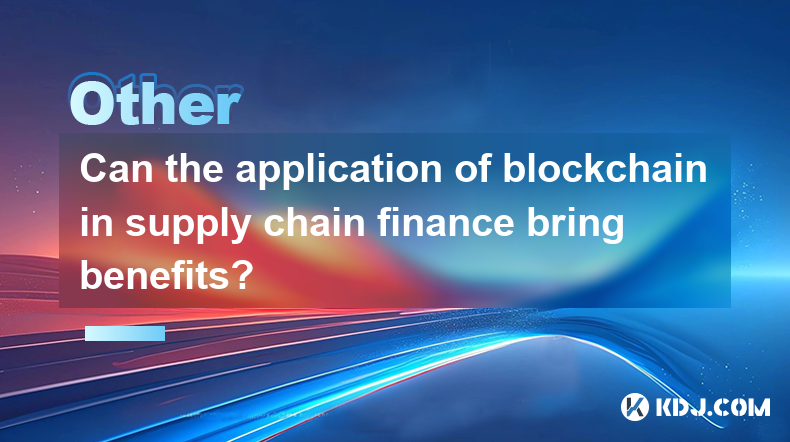
Can the application of blockchain in supply chain finance bring benefits?
Apr 15,2025 at 04:00pm
Can the application of blockchain in supply chain finance bring benefits? The integration of blockchain technology into supply chain finance has garnered significant attention in the cryptocurrency and financial sectors. This article explores how blockchain can potentially revolutionize supply chain finance, detailing its benefits and providing a compre...

Does the ranking of Chinese blockchain apps include cross-chain applications?
Apr 14,2025 at 04:00pm
The ranking of Chinese blockchain apps is a comprehensive evaluation that takes into account various aspects such as user base, transaction volume, and technological innovation. A pertinent question arises regarding whether these rankings include cross-chain applications. Cross-chain applications, which allow different blockchain networks to interact an...
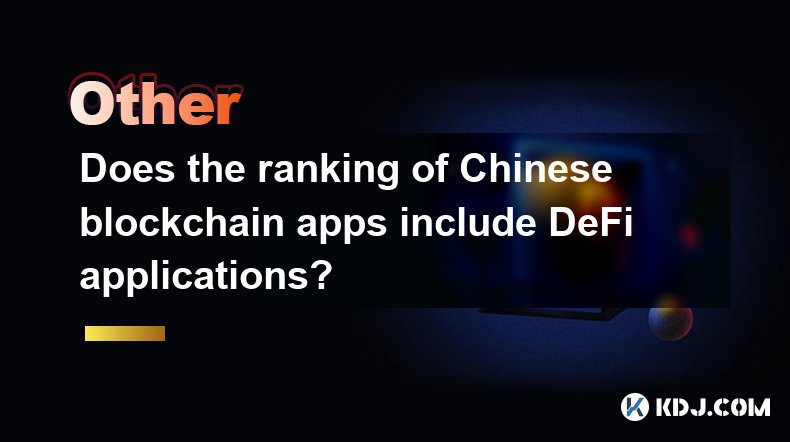
Does the ranking of Chinese blockchain apps include DeFi applications?
Apr 15,2025 at 06:57am
The ranking of Chinese blockchain apps is a comprehensive list that showcases the most popular and influential applications within the cryptocurrency ecosystem. One question that often arises is whether these rankings include DeFi applications. To answer this, we need to delve into the specifics of how these rankings are compiled and what types of appli...
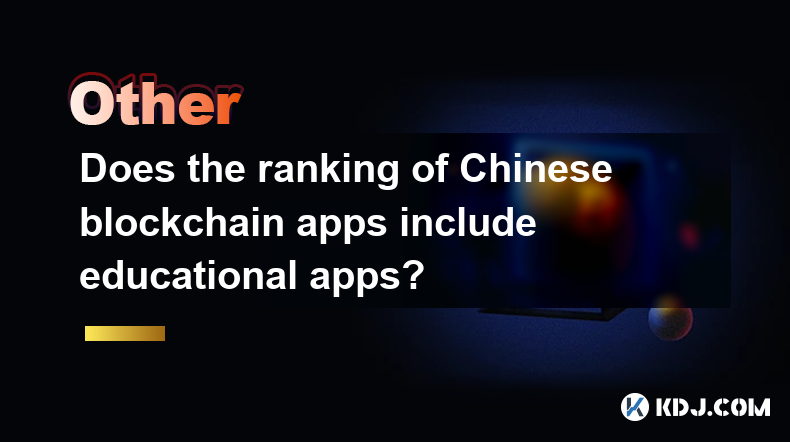
Does the ranking of Chinese blockchain apps include educational apps?
Apr 16,2025 at 03:35am
The ranking of Chinese blockchain apps often includes a variety of categories, from finance and gaming to social networking and beyond. One question that frequently arises is whether these rankings include educational apps. To address this, we need to delve into the specifics of how blockchain apps are categorized and ranked in China, and whether educat...
Does the ranking of Chinese blockchain apps include enterprise-level applications?
Apr 15,2025 at 06:42am
The ranking of Chinese blockchain apps often includes a variety of applications, ranging from consumer-focused to enterprise-level solutions. Understanding the scope and criteria for these rankings is essential to determine if enterprise-level applications are included. This article delves into the specifics of how Chinese blockchain app rankings are co...

Can ICOs in the blockchain space still make money?
Apr 17,2025 at 08:29pm
The landscape of Initial Coin Offerings (ICOs) in the blockchain space has evolved significantly since their peak in 2017 and 2018. Despite the increased regulatory scrutiny and the rise of alternative fundraising methods like Security Token Offerings (STOs) and Initial Exchange Offerings (IEOs), ICOs can still be a viable way to raise funds and generat...

Can the application of blockchain in supply chain finance bring benefits?
Apr 15,2025 at 04:00pm
Can the application of blockchain in supply chain finance bring benefits? The integration of blockchain technology into supply chain finance has garnered significant attention in the cryptocurrency and financial sectors. This article explores how blockchain can potentially revolutionize supply chain finance, detailing its benefits and providing a compre...

Does the ranking of Chinese blockchain apps include cross-chain applications?
Apr 14,2025 at 04:00pm
The ranking of Chinese blockchain apps is a comprehensive evaluation that takes into account various aspects such as user base, transaction volume, and technological innovation. A pertinent question arises regarding whether these rankings include cross-chain applications. Cross-chain applications, which allow different blockchain networks to interact an...

Does the ranking of Chinese blockchain apps include DeFi applications?
Apr 15,2025 at 06:57am
The ranking of Chinese blockchain apps is a comprehensive list that showcases the most popular and influential applications within the cryptocurrency ecosystem. One question that often arises is whether these rankings include DeFi applications. To answer this, we need to delve into the specifics of how these rankings are compiled and what types of appli...

Does the ranking of Chinese blockchain apps include educational apps?
Apr 16,2025 at 03:35am
The ranking of Chinese blockchain apps often includes a variety of categories, from finance and gaming to social networking and beyond. One question that frequently arises is whether these rankings include educational apps. To address this, we need to delve into the specifics of how blockchain apps are categorized and ranked in China, and whether educat...

Does the ranking of Chinese blockchain apps include enterprise-level applications?
Apr 15,2025 at 06:42am
The ranking of Chinese blockchain apps often includes a variety of applications, ranging from consumer-focused to enterprise-level solutions. Understanding the scope and criteria for these rankings is essential to determine if enterprise-level applications are included. This article delves into the specifics of how Chinese blockchain app rankings are co...
See all articles




















































































